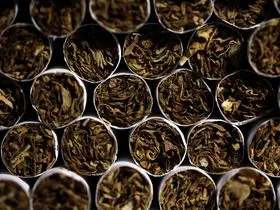
BAT said Wednesday that it’s in pre-clinical testing of a plant-based vaccine via a U.S. biotech subsidiary Kentucky BioProcessing. Philip Morris has said its partially owned Canadian unit Medicago expects to start human trials for a potential vaccine this summer.
“We believe we have made a significant breakthrough,” said David O’Reilly, BAT’s director of scientific research. “We stand ready to work with governments and all stakeholders to help win the war against Covid-19.”
Big Tobacco isn’t a total stranger to the field: BAT’s Kentucky BioProcessing was involved in d
eveloping ZMapp, an Ebola drug, with Mapp Biopharmaceutical Inc. in 2014 -- but that treatment never made it out of the lab. The race to find a vaccine is essential as world leaders question how long countries can remain in lockdown without extinguishing future economic prospects.
“We believe we have made a significant breakthrough,” said David O’Reilly, BAT’s director of scientific research. “We stand ready to work with governments and all stakeholders to help win the war against Covid-19.”
Big Tobacco isn’t a total stranger to the field: BAT’s Kentucky BioProcessing was involved in d
eveloping ZMapp, an Ebola drug, with Mapp Biopharmaceutical Inc. in 2014 -- but that treatment never made it out of the lab. The race to find a vaccine is essential as world leaders question how long countries can remain in lockdown without extinguishing future economic prospects.
The involvement of tobacco companies in the fight against Covid-19 may strike some as paradoxical as the World Health Organization has said smoking may raise the risk of coming down with more severe reactions to the disease.
Philip Morris’s Medicago uses a virus-like particle grown in a close relative of the tobacco plant. Plant-based vaccines mimic viruses and allow the body’s immune system to recognize them and create an immune response, without being able to infect or replicate.
Kentucky BioProcessing recently cloned a portion of Covid-19’s genetic sequence, which led to a substance that induces the production of antibodies. The antigen was then inserted into tobacco plants for reproduction. According to BAT, the method generates the vaccine faster than conventional methods, reducing the time required from several months to about six weeks.
BAT’s U.S. unit Reynolds American bought Kentucky BioProcessing in 2014 planning to use its tobacco extraction technology to develop alternatives to cigarettes. The company is now exploring partnerships with government agencies to bring the experimental vaccine to clinical studies. BAT said while the unit is a commercial business, its work on a Covid-19 vaccine will be on a not-for-profit basis.
Read more: The Search for New Drugs for Coronavirus Faces Long Odds
Researchers in China were quick to share the virus’s genetic sequence with other scientists, providing them with a headstart to hunt for treatments and vaccines. They are testing everything from drugs first developed for HIV and the flu to antibody-containing plasma from recovered patients.
Philip Morris’s Medicago uses a virus-like particle grown in a close relative of the tobacco plant. Plant-based vaccines mimic viruses and allow the body’s immune system to recognize them and create an immune response, without being able to infect or replicate.
Kentucky BioProcessing recently cloned a portion of Covid-19’s genetic sequence, which led to a substance that induces the production of antibodies. The antigen was then inserted into tobacco plants for reproduction. According to BAT, the method generates the vaccine faster than conventional methods, reducing the time required from several months to about six weeks.
BAT’s U.S. unit Reynolds American bought Kentucky BioProcessing in 2014 planning to use its tobacco extraction technology to develop alternatives to cigarettes. The company is now exploring partnerships with government agencies to bring the experimental vaccine to clinical studies. BAT said while the unit is a commercial business, its work on a Covid-19 vaccine will be on a not-for-profit basis.
Read more: The Search for New Drugs for Coronavirus Faces Long Odds
Researchers in China were quick to share the virus’s genetic sequence with other scientists, providing them with a headstart to hunt for treatments and vaccines. They are testing everything from drugs first developed for HIV and the flu to antibody-containing plasma from recovered patients.




















